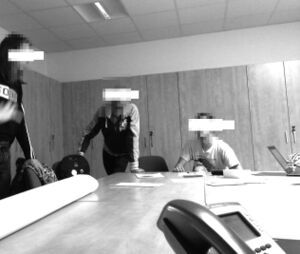Business
business
In my own case, I have been working as an artist with business as my medium and material for almost twenty years. My first foray into commerce was with Feral Trade, a sole trader grocery business operating across mixed terrain of art, social networks, and the commodity sphere since 2003 (for a more detailed description, see the entry for feral in this lexicon). I am also a part of the Cube Cola manufacturing partnership that produces and distributes an open-source cola worldwide. The cola is produced in our kitchen ‘lab’ and mailed out to customers in concentrate form; the recipe is freely shared. And I am a member of the accounts team at the Cube Microplex in Bristol, an all-volunteer-run arts venue that makes its living from the bar and the door takings. These endeavours are not proudly independent but rather the opposite, they make and maintain their interdependence with a constellation of other enterprises, from corporates to colleagues. These are the waste collectors, the regulatory agencies, the flavour industry giants, but they are also the corner shopkeepers, smallholder farms, feminist server collectives and diy shipping lines. To mention just a few like-minded endeavours, Company Drinks in London describe themselves as ‘art in the shape of a community drinks enterprise’.[6] They run a yearly production cycle making and trading fizzy drinks in their community, a form of collectivity in art and economy they claim as a new and vital form of public space. And there is the Sail Cargo Alliance, a Europe-wide gathering of wind-powered sailing vessels, ships captains, and cargo brokers who are assembling a grassroots freight system that challenges not only the fuel source but the logic of the whole supply chain, down to what would be traded and why. Critically, these endeavours are not doing art or activism ‘about’ business but are out there in the world doing business for real.
Taking business as a stage and site for experiments in ‘surviving well together’ (in the words of feminist economist J.K. Gibson-Graham),[7] the kind that might open up routes into other possible worlds, may seem counter-intuitive. Those working in the arts or education may have experienced being swept up or perhaps dragged under by a tide of business vocabulary and values, encapsulated in the bonanza of the Creative Industries that reconfigures creativity as a driver of economic growth. At the same time, the uneasy covenant that ‘business as usual’ would maintain a habitable planet has unarguably failed. Yet these fractures and fissures also point to an uncommon potential. business is widely understood and accessible, it operates in and across wildly different collectives, shapes, and scales. It can act as a Trojan horse, an avatar or exoskeleton in which to navigate this hostile yet contestable space that we hazily call ‘the economy’. The sail cargo captains are negotiating with commercial harbours to bring their vessels into port alongside the container ships. The artist-led drinks companies are merging their recipes to produce a trans-national cola with the potential to take down a stickily secretive, world-dominating incumbent. An artist-anarchist farming partnership finds a route through the welfare system to secure the Farm Household Allowance, an income that will bankroll their agriculture experiments for years to come.
In the case of Feral Trade, a few years back I was fortunate enough to be raided by Trading Standards, the UK consumer protection agency. Trading Standards investigates commercial entities that trade outside the law, they have more powers than the police and can for example enter your home without a warrant. They spent hours swarming the Feral Trade website, then cornered me for an interview. After lengthy negotiations, finding no consumer as such to protect—these are peer-to-peer transactions, negotiated entirely through social routes and relations—I received a kind of de facto, state-sanctioned permission to continue trading, in this grey zone of business that Feral Trade has made its home. A tiny island of regulatory indeterminacy, where the relationship between the commercial and the personal is blurred to the point that the law gets a headache.
These are wildly local and contingent examples; they are not models for anything. They are all also imbricated, co-produced and co-dependent with a host of other elements and effects, including the systems they contest. Yet this is also the point. The prospect of business could not be more salient, viewed from the burning debris of a torched economy. We all already are, have, or are in a unit of livelihood, or many—to annex the words of artist Joseph Beuys: ‘everyone is a business’! The challenge, and the potential, is to bring our day-to-day subsistence in line with the meanings we want to make. business could be a vehicle for doing that.
- ↑ Try scanning the texts of your favourite philosopher, artist, or activist thinker for business and you might see what I mean.
- ↑ ‘Horizons of Possibility: Challenge Co-optation and Transformation’, in Martin Parker et al., eds., The Routledge Companion to Alternative Organization (London: Routledge, 2013), pp. 359–72.
- ↑ Janelle Orsi, Practicing Law in the Sharing Economy: Helping People Build Cooperatives, Social Enterprise, and Local Sustainable Economies (Chicago, IL, American Bar Association, 2012).
- ↑ Warren Nilsson, Organization Unbound: The Spiritual Architecture of Organizations (2007). Available at organizationunbound.org/wp-content/uploads/2011/02
/Organization-Unbound.pdf. - ↑ Matthew Manos, ‘Business as a Medium’, in Garnet Hertz, ed., Critical Making ([Hollywood]: Telharmonium, 2012), pp. 27–32.
- ↑ Kathrin Böhm and Kuba Szreder, ‘How to reclaim the economy using artistic means: The case of Company Drinks’, in J.K. Gibson-Graham and Kelly Dombroski, eds., The Handbook of Diverse Economies (Cheltenham: Edward Elgar Publishing, 2020), pp. 527–34.
- ↑ J.K. Gibson-Graham, Jenny Cameron and Stephen Healy, Take Back the Economy: An Ethical Guide for Transforming Our Communities (Minneapolis: University of Minnesota Press, 2013).
